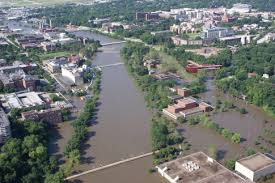U.S. Rep. Dave Loebsack will conduct a press conference at 1:45 p.m. Monday, June 6, at the Stanley Hydraulics Laboratory, 300 South Riverside Drive, Iowa City, to introduce legislation establishing a National Flood Center. The announcement comes on the eve of the anniversary of floods that devastated eastern Iowa, including Iowa City, eight years ago.

Loebsack will discuss the National Flood Research and Education Act (NFREA), which would establish a consortium within the National Oceanic and Atmospheric Administration (NOAA) that includes institutions of higher education in order to advance the understanding of the causes of flooding, to conduct research on flooding, flood prevention, and other flood-related issues.
Loebsack has continued to develop the legislation since the devastating Floods of 2008 in order to help communities facing the threat of flooding prepare better and be smarter.
Also speaking at the press conference will be Larry Weber, Edwin B. Green Chair in Hydraulics, professor of civil and environmental engineering, and director of IIHR -- Hydroscience & Engineering.
The NFREA establishes a National Flood Research and Education Center (NFREC) to conduct research on flooding, flood prevention and other flood-related issues. NFREC will ensure that differing hydrology, weather, urban, suburban, and rural areas and economies are examined so diverse flood situations are represented. Research will be coordinated with a wide-range of federal, state, and local organizations and led by NOAA with an institution of higher education that has significant expertise and experience in examining flood-related issues. The research will provide important insights on comprehensive flooding issues, such as water management or release rates for the Corps of Engineers, flood inundation and preparation, and management and recovery efforts in other local, state and federal agencies.
The National Flood Center’s work will lead to a wide variety of policy and practice recommendations as they relate to predicting, preparing, preventing and recovering from floods. This will include analysis of the economic and social effects of flooding, analysis of federal, state, regional and local flood policy and development and testing of new or improved risk-assessment tools, methods and models, as well as share valuable flood prediction information with the public. The bill will bring together leading institutions in the fields of physical and environmental science, including hydrology, hydraulics, hydrometeorology, climate, as well as engineering, sociology and economics to provide a comprehensive flood research.